彼得-德鲁克 自我管理
21世纪的管理挑战之自我管理

21世纪的管理挑战之自我管理-- 《二十一世纪的管理挑战》读后感彼得.德鲁克说过:“本书真正关注的是:-------我们社会的未来。
”我们生活在意义深远的转型期,我们需要从自我管理、管理的新模式、战略----新的必然趋势、变革的引导者、信息挑战、知识工作者的生产率6个方面来深刻分析21世纪管理者面临的挑战。
因此,作为21世纪的新新人类,我决定本书的理论来学会自我管理。
自我分析1、我的优势我是一个认真仔细的人,充满热情和新思想,乐观、自然、富有创造性和自信,具有独创性的思想和对可能性的强烈感受。
勤奋而负有责任感,做事深思熟虑、坚持到底,信守承若并值得信赖。
善于聆听他人的意见,注意他人的感受并极力使他们快乐,对人和善、心情平静,对细节较为敏感,有实际的判断力,能将大把的精力倾注到工作中,积极主动性强,有较强的团队意识,适应性强,能被别人接受,能接纳别人,关心人。
同时具有魅力、充满生机。
待人热情、彬彬有礼,具有出色的洞察力和观察力,喜欢保持一种广泛的人际关系。
2、做事能力积极主动做事,有领导组织能力。
善于倾听他人想法,乐观向上,努力学习,拼搏奋斗,不怕挫折,敢于挑战。
我的价值观是:世界是公平的,机会是平等的,凡事都应该你自己去奋斗拼搏,才会成功。
3、我的贡献在决定我应作出什么样的贡献时,我们需要权衡三个因素:一在这种情况下在这种情况下,我需要做什么?二我如何利用我的优势,我做事的方式方,我做出这样贡献的目的是什么?三要产生不同凡向的影响,我需要取得什么样的成绩?4、对关系负责无论组织的成员或自由工作者,大多数人都与他人共事。
因此,管理自己的必要条件之一,就是要为你的关系负责。
关系的责任,可从两个部分来看。
第一部分先要认识,每个人都是与你一样的个体,所以你必须了解共事者的长处、做事方法与价值观。
听起来很容易,然而认真听进去的人却很少。
第二个部分,是要负起沟通的责任。
在思考了"我的长处是什么,我的工作方式是什么,我的价值观是什么,我的贡献应该是什么"等问题之后,接下来必须问:"谁必须知道这些?谁的工作必须依赖我?我的工作又必须依赖谁?"同时让他们知道以上问题的答案.组织的基础不再是权力,而是信赖。
德鲁克学习心得感悟
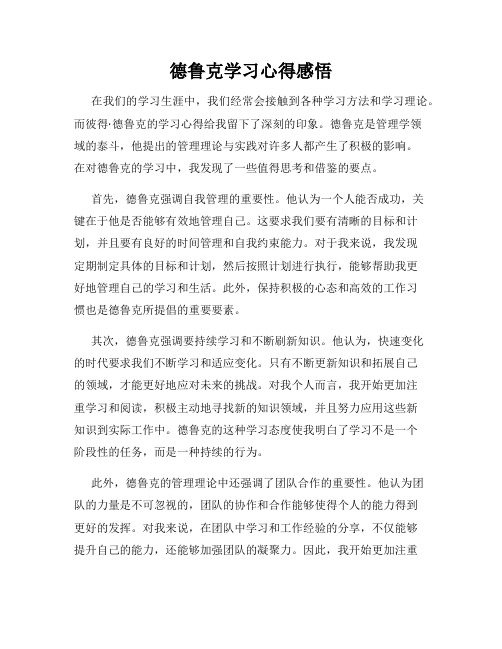
德鲁克学习心得感悟在我们的学习生涯中,我们经常会接触到各种学习方法和学习理论。
而彼得·德鲁克的学习心得给我留下了深刻的印象。
德鲁克是管理学领域的泰斗,他提出的管理理论与实践对许多人都产生了积极的影响。
在对德鲁克的学习中,我发现了一些值得思考和借鉴的要点。
首先,德鲁克强调自我管理的重要性。
他认为一个人能否成功,关键在于他是否能够有效地管理自己。
这要求我们要有清晰的目标和计划,并且要有良好的时间管理和自我约束能力。
对于我来说,我发现定期制定具体的目标和计划,然后按照计划进行执行,能够帮助我更好地管理自己的学习和生活。
此外,保持积极的心态和高效的工作习惯也是德鲁克所提倡的重要要素。
其次,德鲁克强调要持续学习和不断刷新知识。
他认为,快速变化的时代要求我们不断学习和适应变化。
只有不断更新知识和拓展自己的领域,才能更好地应对未来的挑战。
对我个人而言,我开始更加注重学习和阅读,积极主动地寻找新的知识领域,并且努力应用这些新知识到实际工作中。
德鲁克的这种学习态度使我明白了学习不是一个阶段性的任务,而是一种持续的行为。
此外,德鲁克的管理理论中还强调了团队合作的重要性。
他认为团队的力量是不可忽视的,团队的协作和合作能够使得个人的能力得到更好的发挥。
对我来说,在团队中学习和工作经验的分享,不仅能够提升自己的能力,还能够加强团队的凝聚力。
因此,我开始更加注重与同学和同事之间的沟通和合作,积极利用团队的力量来实现共同的目标。
最后,我感受到了德鲁克对于人文关怀的强调。
他认为管理不仅仅是关注业绩和结果,更重要的是关心和尊重每一个员工的需求和价值。
作为学习者,我也要更加关注每一个人的成长和发展,并且在与人交往中注重关怀和尊重。
只有这样,我们才能够打造一个积极向上的学习和工作环境。
总结一下,在对德鲁克的学习中,我学到了自我管理的重要性、持续学习的态度、团队合作的力量和人文关怀的价值。
这些观点和方法指导着我在学习和生活中做出更好的选择和决策。
彼得德鲁克方法论

彼得德鲁克方法论彼得德鲁克(Peter Drucker)是管理学领域的重要思想家和学者。
他的管理方法论被广泛应用于企业管理和组织发展领域。
彼得德鲁克提出了许多对现代管理具有重要指导意义的理论和观点。
以下是他的一些重要方法论。
第一,自觉性和自我管理。
彼得德鲁克认为,管理者首先要进行自我分析,了解自己的优势和劣势,明确自己的目标和价值观,并进行有效的自我管理。
他主张管理者要时刻对自己的行为和决策进行反思和调整,不断学习和成长,提高自己的能力和素质。
第二,有效的执行力。
彼得德鲁克提出了“执行力是管理的关键”这一观点。
他认为,没有有效的执行力,任何计划和策略都只是空谈。
他强调,管理者要具备决策、行动和完成任务的能力,并要对组织中的员工进行有效的授权和激励,以确保计划的顺利实施。
第三,关注结果。
彼得德鲁克提出了“结果导向”这一重要原则。
他认为,管理者应该把注意力集中在实现结果上,而不是纠缠于过程和细节。
他主张制定明确的目标和绩效指标,并对下属进行绩效考核和激励,以激发他们的工作热情和创造力。
第四,以人为本。
彼得德鲁克强调,组织的核心资源是人力资源。
他认为,管理者应该关注员工的成长和发展,激发他们的潜力和创造力。
他主张建立积极的工作环境,提供发展机会和培训,使员工能够充分发挥自己的才能和能力。
第五,创新和创造力。
彼得德鲁克认为,创新是组织发展的驱动力。
他主张管理者要鼓励员工提出新的想法和方法,鼓励他们进行积极的试验和创新。
他强调,创新是一种管理技能,管理者需要培养和提高自己的创新意识和能力。
第六,社会责任。
彼得德鲁克提出了“企业应该承担社会责任”的观点。
他认为,企业不仅是为了追求经济利益而存在的,还应该承担起社会责任,关注社会问题和环境保护。
他主张企业与社会各界进行积极合作,共同解决社会问题,实现可持续发展。
彼得德鲁克的方法论无疑对现代管理实践具有重要的指导意义。
他的理论和观点强调了管理者的自觉性和自我管理能力,强调了有效的执行力和关注结果,提出了以人为本和激发创造力的管理原则,同时也强调了企业的社会责任。
德鲁克谈自我管理

德鲁克谈自我管理自我管理是一种重要的生活技能,也是提高个人效率和成功的关键之一。
著名管理学家彼得·德鲁克在他的著作《管理的实践》中详细阐述了自我管理的重要性和方法。
本文将围绕德鲁克的观点,探讨自我管理的概念、重要性和实践方法。
1. 自我管理的概念自我管理是指个人对自己的思想、情绪和行为进行有效的控制和引导,以实现个人目标和提高工作效率。
它涉及到对时间的合理利用、任务的组织安排、自我激励和自我反省等方面。
德鲁克认为,自我管理是一种主动的行为,而不是被动的应对。
它要求个人明确自己的价值观和优先级,并根据这些价值观制定长期和短期的目标。
同时,自我管理还需要个人具备良好的自我认知能力,能够准确评估自己的能力、资源和限制,从而做出合理的决策和行动。
2. 自我管理的重要性自我管理对于个人的成功和成就至关重要。
它不仅可以提高个人的工作效率和工作质量,还可以增强个人的自信心和职业发展。
首先,自我管理可以提高个人的工作效率。
通过合理安排时间和任务,个人可以减少无效的时间浪费和重复劳动,从而提高工作的效率和生产力。
此外,自我管理还可以帮助个人更好地掌控自己的目标和计划,减少拖延和分心的现象,从而更好地专注于工作。
其次,自我管理可以提高个人的工作质量。
自我管理意味着个人要对自己的工作负责,要求个人具备自我监督和自我调整的能力。
只有这样,个人才能时刻保持高度专注和高效执行,从而提供高质量的工作成果。
最后,自我管理还可以增强个人的自信心和职业发展。
通过自我管理,个人能够更好地认识自己的能力和潜力,形成积极的自我认知。
同时,个人也可以通过自我管理不断提升自己的能力和技能,从而实现自己的职业目标和提升职业价值。
综上所述,自我管理对于个人来说是非常重要的。
它可以提高个人的工作效率和工作质量,增强个人的自信心和职业发展。
3. 自我管理的实践方法3.1 制定明确的目标自我管理的第一步是制定明确的目标。
目标应该是具体、可量化和有时限的,同时也要与个人的价值观和兴趣相符。
德鲁克提出的卓有成效的五项
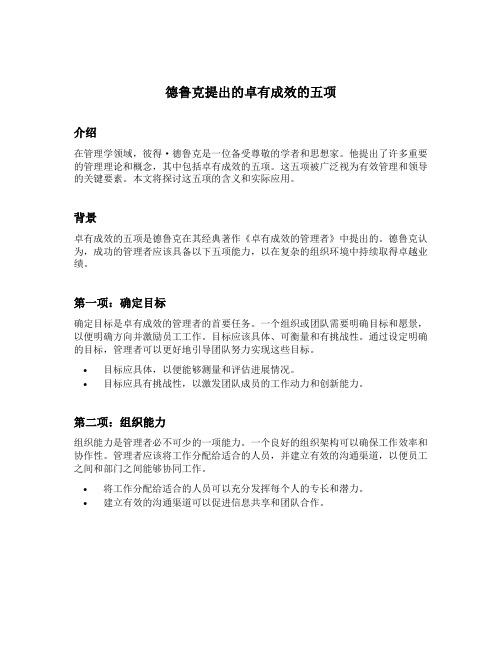
德鲁克提出的卓有成效的五项介绍在管理学领域,彼得·德鲁克是一位备受尊敬的学者和思想家。
他提出了许多重要的管理理论和概念,其中包括卓有成效的五项。
这五项被广泛视为有效管理和领导的关键要素。
本文将探讨这五项的含义和实际应用。
背景卓有成效的五项是德鲁克在其经典著作《卓有成效的管理者》中提出的。
德鲁克认为,成功的管理者应该具备以下五项能力,以在复杂的组织环境中持续取得卓越业绩。
第一项:确定目标确定目标是卓有成效的管理者的首要任务。
一个组织或团队需要明确目标和愿景,以便明确方向并激励员工工作。
目标应该具体、可衡量和有挑战性。
通过设定明确的目标,管理者可以更好地引导团队努力实现这些目标。
•目标应具体,以便能够测量和评估进展情况。
•目标应具有挑战性,以激发团队成员的工作动力和创新能力。
第二项:组织能力组织能力是管理者必不可少的一项能力。
一个良好的组织架构可以确保工作效率和协作性。
管理者应该将工作分配给适合的人员,并建立有效的沟通渠道,以便员工之间和部门之间能够协同工作。
•将工作分配给适合的人员可以充分发挥每个人的专长和潜力。
•建立有效的沟通渠道可以促进信息共享和团队合作。
第三项:有效决策一个卓有成效的管理者必须具备有效的决策能力。
决策是管理过程中不可或缺的一部分,需要管理者综合各种因素并做出明智的选择。
决策时应该考虑到组织的目标和利益,并权衡不同的选项。
•有效的决策需要管理者有明确的信息来源和分析能力。
•在做出决策时应该权衡不同的选项,并考虑到长远的影响。
第四项:培养团队管理者必须具备培养团队的能力。
一个高效的团队可以更好地实现组织的目标并应对挑战。
管理者应该了解并满足员工的需求,提供必要的培训和发展机会,并鼓励团队成员之间的合作与信任。
•培养团队需要管理者积极倾听员工的反馈和建议,并提供必要的支持和资源。
•鼓励团队成员之间的合作和信任可以提高整个团队的绩效。
第五项:自我管理卓有成效的管理者必须具备自我管理的能力。
学习德鲁克的10个管理心得
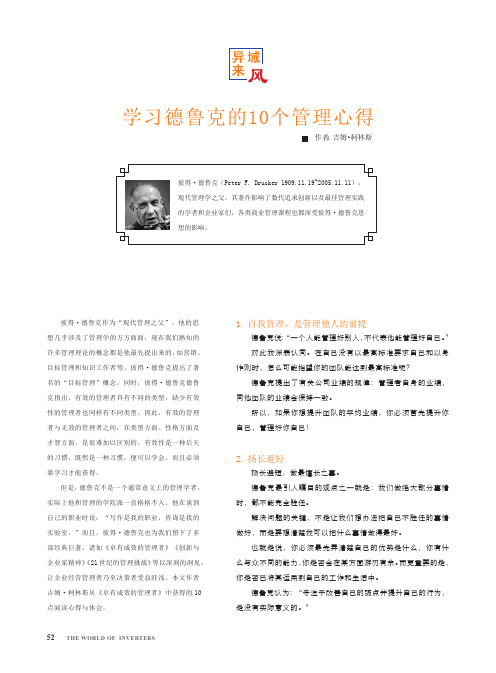
作者:吉姆·柯林斯彼得·德鲁克作为“现代管理之父”,他的思想几乎涉及了管理学的方方面面,现在我们熟知的许多管理理论的概念都是他最先提出来的,如营销、目标管理和知识工作者等。
彼得·德鲁克提出了著名的“目标管理”概念。
同时,彼得·德鲁克德鲁克指出,有效的管理者具有不同的类型,缺少有效性的管理者也同样有不同类型。
因此,有效的管理者与无效的管理者之间,在类型方面、性格方面及才智方面,是很难加以区别的。
有效性是一种后天的习惯,既然是一种习惯,便可以学会,而且必须靠学习才能获得。
但是,德鲁克不是一个通常意义上的管理学者,实际上他和管理的学院派一直格格不入。
他在谈到自己的职业时说:“写作是我的职业,咨询是我的实验室。
”而且,彼得·德鲁克也为我们留下了多部经典巨著,诸如《卓有成效的管理者》《创新与企业家精神》《21世纪的管理挑战》等以深刻的洞见,让企业经营管理者乃至决策者受益匪浅。
本文作者吉姆·柯林斯从《卓有成效的管理者》中获得的10点阅读心得与体会。
1.自我管理,是管理他人的前提德鲁克说:“一个人能管理好别人,不代表他能管理好自己。
”对此我深表认同。
在自己没有以最高标准要求自己和以身作则时,怎么可能指望你的团队能达到最高标准呢?德鲁克提出了有关公司业绩的规律:管理者自身的业绩,同他团队的业绩会保持一致。
所以,如果你想提升团队的平均业绩,你必须首先提升你自己,管理好你自己!2.扬长避短扬长避短,做最擅长之事。
德鲁克最引人瞩目的观点之一就是:我们做绝大部分事情时,都不能完全胜任。
解决问题的关键,不是让我们想办法把自己不胜任的事情做好,而是要想清楚我可以把什么事情做得最好。
也就是说,你必须最先弄清楚自己的优势是什么,你有什么与众不同的能力,你是否会在某方面游刃有余。
而更重要的是,你是否已将其运用到自己的工作和生活中。
德鲁克认为:“专注于改善自己的弱点并提升自己的行为,是没有实际意义的。
德鲁克的22个管理思想精髓

德鲁克的22个管理思想精髓德鲁克(Peter Drucker)被誉为现代管理学之父,他对管理理论和实践的贡献堪称经典。
在他的众多著作中,包括《管理常识的新领域》、《创新与企业家精神》等,我们可以找到他的管理思想精髓。
本文将介绍德鲁克的22个管理思想精髓,并对其进行阐述和讨论。
1. 目标管理(Management by Objectives):德鲁克认为,管理者应该制定明确的目标,并将其传达给员工。
目标服务于企业的使命和愿景,激发员工的积极性和创造力,实现个人与组织的共同发展。
2. 知识工作者(Knowledge Worker):德鲁克提出了“知识工作者”的概念,强调在现代社会,“脑力劳动”比“体力劳动”更加重要。
管理者需要不断提供条件和机会,激发员工的学习和创新能力。
3. 管理者的使命(The Manager’s Job):德鲁克认为,管理者的使命是实现组织的目标,不仅关注内部管理,还需关注外部环境的变化,并及时调整战略和行动。
4. 客户第一(Customer First):德鲁克强调,企业的存在和发展都是为了满足客户需求。
管理者应该不断了解客户,提供更好的产品和服务,实现企业的可持续发展。
5. 有效的执行(Effective Execution):德鲁克认为,好的战略和计划并不足以保证成功,关键在于有效的执行。
管理者需要明确责任,建立有效的沟通和反馈机制,保证组织的执行力。
6. 创新与创业(Innovation and Entrepreneurship):德鲁克认为,创新是组织的生命力所在。
管理者应该鼓励员工提出新的想法和解决方案,培养创新文化。
7. 管理者的责任(Management Responsibility):德鲁克认为,管理者的责任不仅限于组织内部,还包括对员工、社会和环境的责任。
管理者需要接受道德约束,坚持社会责任。
8. 管理者的人际关系(Manager’s Relationships):德鲁克认为,管理者需要建立良好的人际关系,与员工、同事、上级和合作伙伴保持良好的合作与沟通,实现团队的协作与效能。
德鲁克自我管理心得体会

德鲁克自我管理心得体会•相关推荐德鲁克自我管理心得体会(通用17篇)当我们积累了新的体会时,就十分有必须要写一篇心得体会,这样我们可以养成良好的总结方法。
一起来学习心得体会是如何写的吧,以下是小编为大家整理的德鲁克自我管理心得体会,供大家参考借鉴,希望可以帮助到有需要的朋友。
德鲁克自我管理心得体会篇1第一次接触到了德鲁克,也第一次接触了他的管理理论,他被称为大师中的大师。
在参加培训以前我总觉得管理离我很遥远,,我只要恪尽职守,做好自己的工作就可以了。
近期利用业余时间,我开始阅读德鲁克的《德鲁克论管理》,虽然还没有全面学习,但对自我管理有了一定的了解,也有了一点心得。
首先我了解了什么是管理者。
德鲁克认为的管理者不是我们理解的领导,比如行长、处长,只要是知识型的工作者都是管理者。
这在很大程度上扩大了管理者的范围。
我们农行的绝大多数员工都是知识性的管理者。
其次了解了管理首先不是管理他人而是管理自己,即自我管理。
其实“认识你自己”是一个古老的哲学命题,在希腊古城的阿波罗神殿上就刻有“人呀,认识你自己”。
大家都知道认识别人容易,认识自己比较难,正确的认识自己就更难。
现在科技日新月异,信息充斥世界的情况下,我们越来越崇拜技术,追逐利益,对自己认识的时间越来越少。
德鲁克认为管理他人的前提是管好自己,管好自己的前提是正确的认识自己。
德鲁克用浅显的方式提出一系列问题来使我们不断思考,比如我的优势是什么?怎样才能发现自己的优势?我该做什么贡献?我能做什么贡献等。
第三、是不能忽略了解自己的优势。
我们总觉得认识自我的时候最容易的是了解自己的优势,不能正确的评价自己的劣势。
通常的观点是我们为了获得更大的成功或是谋求更大的发展需要花更多的精力来改善自己的不足。
德鲁克却认为人们经常把自己的劣势搞错。
也就是说我们平时经常会犯这样的错误,就是不断学习自己并不擅长的东西,而忽略了我们的优势。
我们应该更过的关注自己有什么优势,因为我们无法通过自己无法胜任的事情来取得绩效。
德鲁克谈自我管理
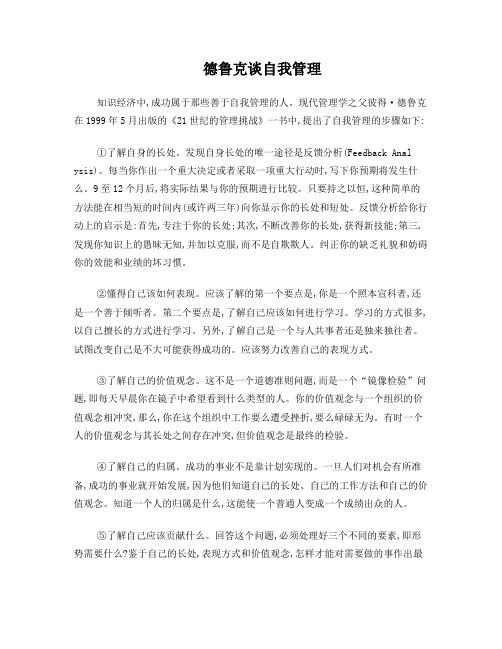
德鲁克谈自我管理知识经济中,成功属于那些善于自我管理的人。
现代管理学之父彼得·德鲁克在1999年5月出版的《21世纪的管理挑战》一书中,提出了自我管理的步骤如下:①了解自身的长处。
发现自身长处的唯一途径是反馈分析(Feedback Anal ysis)。
每当你作出一个重大决定或者采取一项重大行动时,写下你预期将发生什么。
9至12个月后,将实际结果与你的预期进行比较。
只要持之以恒,这种简单的方法能在相当短的时间内(或许两三年)向你显示你的长处和短处。
反馈分析给你行动上的启示是:首先,专注于你的长处;其次,不断改善你的长处,获得新技能;第三,发现你知识上的愚昧无知,并加以克服,而不是自欺欺人。
纠正你的缺乏礼貌和妨碍你的效能和业绩的坏习惯。
②懂得自己该如何表现。
应该了解的第一个要点是,你是一个照本宣科者,还是一个善于倾听者。
第二个要点是,了解自己应该如何进行学习。
学习的方式很多,以自己擅长的方式进行学习。
另外,了解自己是一个与人共事者还是独来独往者。
试图改变自己是不大可能获得成功的。
应该努力改善自己的表现方式。
③了解自己的价值观念。
这不是一个道德准则问题,而是一个“镜像检验”问题,即每天早晨你在镜子中希望看到什么类型的人。
你的价值观念与一个组织的价值观念相冲突,那么,你在这个组织中工作要么遭受挫折,要么碌碌无为。
有时一个人的价值观念与其长处之间存在冲突,但价值观念是最终的检验。
④了解自己的归属。
成功的事业不是靠计划实现的。
一旦人们对机会有所准备,成功的事业就开始发展,因为他们知道自己的长处、自己的工作方法和自己的价值观念。
知道一个人的归属是什么,这能使一个普通人变成一个成绩出众的人。
⑤了解自己应该贡献什么。
回答这个问题,必须处理好三个不同的要素,即形势需要什么?鉴于自己的长处,表现方式和价值观念,怎样才能对需要做的事作出最大贡献?最后,为了发挥影响,必须实现什么结果?由此得出的行动方针将是:做什么,在何处以及如何开始做,确立什么目标和最后期限。
彼得德鲁克管理自己
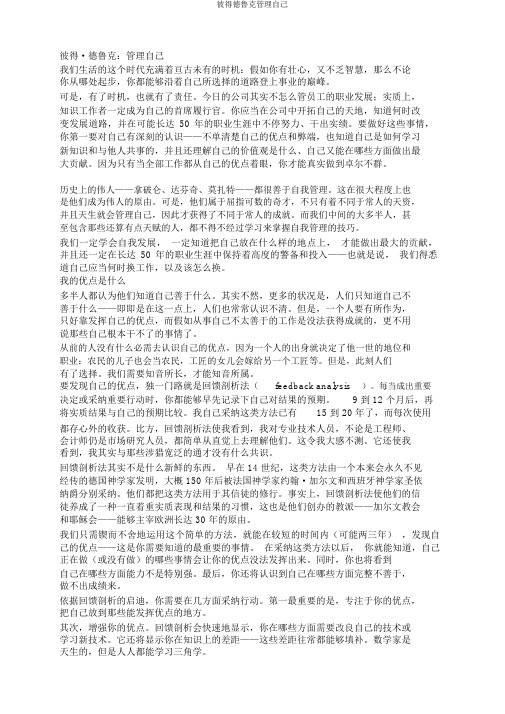
彼得·德鲁克:管理自己我们生活的这个时代充满着亘古未有的时机:假如你有壮心,又不乏智慧,那么不论你从哪处起步,你都能够沿着自己所选择的道路登上事业的巅峰。
可是,有了时机,也就有了责任。
今日的公司其实不怎么管员工的职业发展;实质上,知识工作者一定成为自己的首席履行官。
你应当在公司中开拓自己的天地,知道何时改变发展道路,并在可能长达50 年的职业生涯中不停努力、干出实绩。
要做好这些事情,你第一要对自己有深刻的认识——不单清楚自己的优点和弊端,也知道自己是如何学习新知识和与他人共事的,并且还理解自己的价值观是什么、自己又能在哪些方面做出最大贡献。
因为只有当全部工作都从自己的优点着眼,你才能真实做到卓尔不群。
历史上的伟人——拿破仑、达芬奇、莫扎特——都很善于自我管理。
这在很大程度上也是他们成为伟人的原由。
可是,他们属于屈指可数的奇才,不只有着不同于常人的天资,并且天生就会管理自己,因此才获得了不同于常人的成就。
而我们中间的大多半人,甚至包含那些还算有点天赋的人,都不得不经过学习来掌握自我管理的技巧。
我们一定学会自我发展,一定知道把自己放在什么样的地点上,才能做出最大的贡献,并且还一定在长达50 年的职业生涯中保持着高度的警备和投入——也就是说,我们得悉道自己应当何时换工作,以及该怎么换。
我的优点是什么多半人都认为他们知道自己善于什么。
其实不然,更多的状况是,人们只知道自己不善于什么——即即是在这一点上,人们也常常认识不清。
但是,一个人要有所作为,只好靠发挥自己的优点,而假如从事自己不太善于的工作是没法获得成就的,更不用说那些自己根本干不了的事情了。
从前的人没有什么必需去认识自己的优点,因为一个人的出身就决定了他一世的地位和职业:农民的儿子也会当农民,工匠的女儿会嫁给另一个工匠等。
但是,此刻人们有了选择。
我们需要知音所长,才能知音所属。
要发现自己的优点,独一门路就是回馈剖析法(feedback analysis)。
【免费下载】德鲁克管理自己
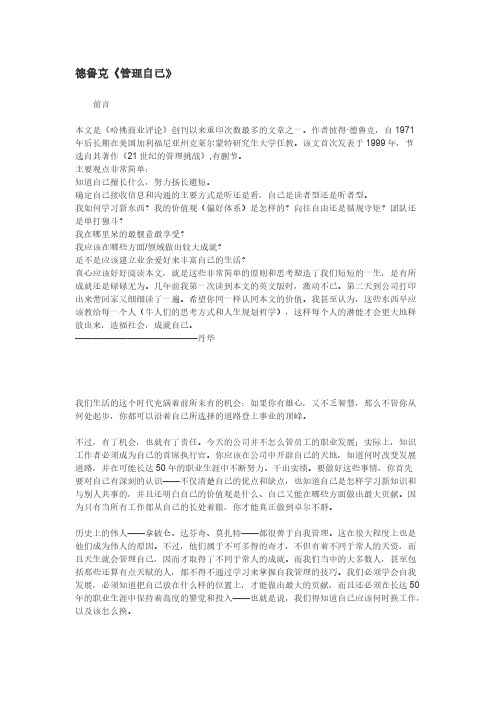
德鲁克《管理自己》前言本文是《哈佛商业评论》创刊以来重印次数最多的文章之一。
作者彼得·德鲁克,自1971年后长期在美国加利福尼亚州克莱尔蒙特研究生大学任教。
该文首次发表于1999年,节选自其著作《21世纪的管理挑战》,有删节。
主要观点非常简单:知道自己擅长什么,努力扬长避短。
确定自己接收信息和沟通的主要方式是听还是看,自己是读者型还是听者型。
我如何学习新东西?我的价值观(偏好体系)是怎样的?向往自由还是循规守矩?团队还是单打独斗?我在哪里呆的最惬意最享受?我应该在哪些方面/领域做出较大成就?是不是应该建立业余爱好来丰富自己的生活?真心应该好好阅读本文,就是这些非常简单的原则和思考塑造了我们短短的一生,是有所成就还是碌碌无为。
几年前我第一次读到本文的英文版时,激动不已。
第二天到公司打印出来带回家又细细读了一遍。
希望你同一样认同本文的价值。
我甚至认为,这些东西早应该教给每一个人(牛人们的思考方式和人生规划哲学),这样每个人的潜能才会更大地释放出来,造福社会,成就自己。
——————————————丹华我们生活的这个时代充满着前所未有的机会:如果你有雄心,又不乏智慧,那么不管你从何处起步,你都可以沿着自己所选择的道路登上事业的顶峰。
不过,有了机会,也就有了责任。
今天的公司并不怎么管员工的职业发展;实际上,知识工作者必须成为自己的首席执行官。
你应该在公司中开辟自己的天地,知道何时改变发展道路,并在可能长达50年的职业生涯中不断努力、干出实绩。
要做好这些事情,你首先要对自己有深刻的认识——不仅清楚自己的优点和缺点,也知道自己是怎样学习新知识和与别人共事的,并且还明白自己的价值观是什么、自己又能在哪些方面做出最大贡献。
因为只有当所有工作都从自己的长处着眼,你才能真正做到卓尔不群。
历史上的伟人——拿破仑、达芬奇、莫扎特——都很善于自我管理。
这在很大程度上也是他们成为伟人的原因。
不过,他们属于不可多得的奇才,不但有着不同于常人的天资,而且天生就会管理自己,因而才取得了不同于常人的成就。
自我管理相关概念与学说
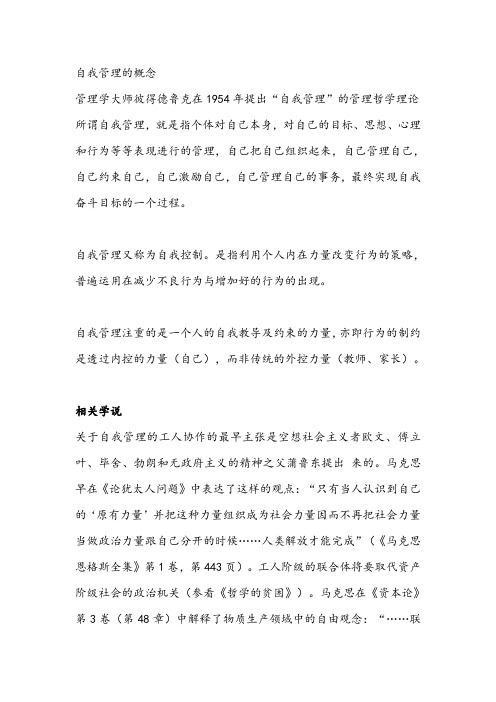
自我管理的概念管理学大师彼得德鲁克在1954年提出‚自我管理‛的管理哲学理论所谓自我管理,就是指个体对自己本身,对自己的目标、思想、心理和行为等等表现进行的管理,自己把自己组织起来,自己管理自己,自己约束自己,自己激励自己,自己管理自己的事务,最终实现自我奋斗目标的一个过程。
自我管理又称为自我控制。
是指利用个人内在力量改变行为的策略,普遍运用在减少不良行为与增加好的行为的出现。
自我管理注重的是一个人的自我教导及约束的力量,亦即行为的制约是透过内控的力量(自己),而非传统的外控力量(教师、家长)。
相关学说关于自我管理的工人协作的最早主张是空想社会主义者欧文、傅立叶、毕舍、勃朗和无政府主义的精神之父蒲鲁东提出来的。
马克思早在《论犹太人问题》中表达了这样的观点:‚只有当人认识到自己的‘原有力量’并把这种力量组织成为社会力量因而不再把社会力量当做政治力量跟自己分开的时候……人类解放才能完成‛(《马克思恩格斯全集》第1卷,第443页)。
工人阶级的联合体将要取代资产阶级社会的政治机关(参看《哲学的贫困》)。
马克思在《资本论》第3卷(第48章)中解释了物质生产领域中的自由观念:‚……联合起来的生产者,将合理地调节他们和自然之间的物质变换‛,而且是‚在最无愧于和最适合于他们的人类本性的条件下来进行这种物质变换"。
无政府主义者(巴枯宁、克鲁泡特金、勒克律、马拉特斯塔)阐发了以自治团体的联合来取代国家的思想。
基尔特社会主义提供了工人的纵向联合主张。
工团主义主张由工会进行管理,这是对先锋队政党的领导权要求的一种重要的替换物。
然而,独立的工会的正常作用似乎是维护工人利益和培养工人的共同意志,而不是监督那应当独自负责决策的自我管理机构。
一切社会主义革命运动,无论成功与否,从巴黎公社到波兰的团结工会,多少自发地创造了一些自我管理机构。
特别重要的是南斯拉夫的实际经验,那里自我管理的初步形式(与自由化的 党政治制度并存)创立于20世纪50年代初期。
彼得德鲁克经典 管理自己
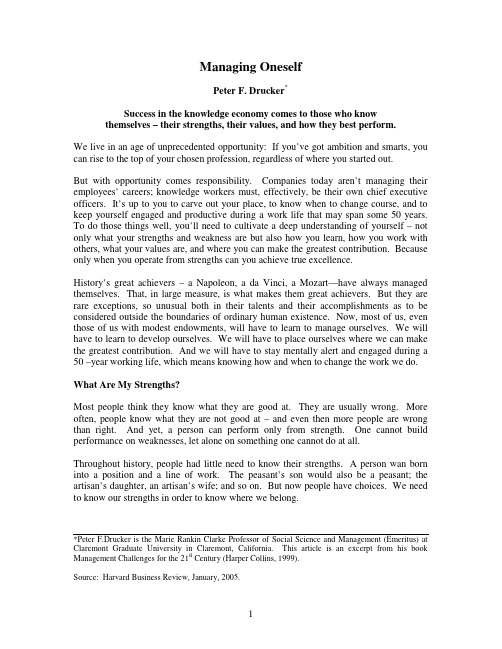
Managing OneselfPeter F. Drucker*Success in the knowledge economy comes to those who know themselves – their strengths, their values, and how they best perform.We live in an age of unprecedented opportunity: If you’ve got ambition and smarts, you can rise to the top of your chosen profession, regardless of where you started out.But with opportunity comes responsibility. Companies today aren’t managing their employees’ careers; knowledge workers must, effectively, be their own chief executive officers. It’s up to you to carve out your place, to know when to change course, and to keep yourself engaged and productive during a work life that may span some 50 years. To do those things well, you’ll need to cultivate a deep understanding of yourself – not only what your strengths and weakness are but also how you learn, how you work with others, what your values are, and where you can make the greatest contribution. Because only when you operate from strengths can you achieve true excellence.History’s great achievers – a Napoleon, a da Vinci, a Mozart—have always managed themselves. That, in large measure, is what makes them great achievers. But they are rare exceptions, so unusual both in their talents and their accomplishments as to be considered outside the boundaries of ordinary human existence. Now, most of us, even those of us with modest endowments, will have to learn to manage ourselves. We will have to learn to develop ourselves. We will have to place ourselves where we can make the greatest contribution. And we will have to stay mentally alert and engaged during a 50 –year working life, which means knowing how and when to change the work we do. What Are My Strengths?Most people think they know what they are good at. They are usually wrong. More often, people know what they are not good at – and even then more people are wrong than right. And yet, a person can perform only from strength. One cannot build performance on weaknesses, let alone on something one cannot do at all.Throughout history, people had little need to know their strengths. A person wan born into a position and a line of work. The peasant’s son would also be a peasant; the artisan’s daughter, an artisan’s wife; and so on. But now people have choices. We need to know our strengths in order to know where we belong.*Peter F.Drucker is the Marie Rankin Clarke Professor of Social Science and Management (Emeritus) at Claremont Graduate University in Claremont, California. This article is an excerpt from his book Management Challenges for the 21st Century (Harper Collins, 1999).Source: Harvard Business Review, January, 2005.The only way to discover your strengths is through feedback analysis. Whenever you make a key decision or take a key action, write down what you expect will happen. Nine or 12 months later, compare the actual results with your expectations. I have been practicing this method for 15 to 20 years now, and every time I do it, I am surprised. The feedback analysis showed me, for instance – and to my great surprise – I have an intuitive understanding of technical people, whether they are engineers or accountants or market researchers. It also showed me that I don’t really resonate with generalists.Feedback analysis is by no means new. It was invented sometime in the fourteenth century by an otherwise totally obscure German theologian and picked up quite independently, some 150 years later, by John Calvin and Ignatius of Loyola, each of whom incorporated it into the practice of his followers. In fact, the steadfast focus on performance and results that this habit produces explains why the institutions these two men founded, the Calvinist church and the Jesuit order, came to dominate Europe within 30 years.Practiced consistently, this simple method will show you within a fairly short period of time, may be two or three years, where your strengths lie – and this is the most important thing to know. The method will show you what your are doing or failing to do that deprives you of the full benefits of your strengths. It will show you where you are not particularly competent. And finally, it will show you where you have no strengths and cannot perform.Several implications for action follow from feedback analysis. First and foremost, concentrate on your strengths. Put yourself where your strengths can produce results.Second, work on improving your strengths. Analysis will rapidly show where you need to improve skills or acquire new ones. It will also show the gaps in your knowledge – and those can usually be filled. Mathematicians are born, but everyone can learn trigonometry.Third, discover where your intellectual arrogance is causing disabling ignorance and overcome it. Far too many people – especially people with great expertise in one area – are contemptuous of knowledge in other areas or believe that being bright is a substitute for knowledge. First-rate engineers, for instance, tend to take pride in not knowing anything about people. Human beings, they believe, are much too disorderly for the good engineering mind. Human resources professionals, by contrast, often pride themselves on their ignorance of elementary accounting or of quantitative methods altogether. But taking pride in such ignorance is self-defeating. Go to work on acquiring the skills and knowledge you need to fully realize your strengths.It is equally essential to remedy your bad habits - the things you do or fail to do that inhibit your effectiveness and performance. Such habits will quickly show up in the feedback. For example, a planner may find that his beautiful plans fail because he does not follow through on them. Like so many brilliant people, he believes that ideas move mountain. But bulldozers move mountains; ideas show where the bulldozers should go towork. This planner will have to learn that the work does not stop when the plan is completed. He must find people to carry out the plan and explain it to them. He must adapt and change it as he puts it into action. And finally, he must decide when to stop pushing the plan.At the same time, feedback will also reveal when the problem is a lack of manners. Manners are the lubricating oil of an organization. It is a law of nature that two moving bodies in contact with each other create friction. This is as true for human beings as it is for inanimate objects. Manners – simple things like says “please” and “thank you” and knowing a person’s name or asking after her family – enable two people to work together whether they like each other or not. Bright people, especially bright young people, often do not understand this. If analysis shows that someone’s brilliant work fails again and again as soon as cooperation from others is required, it probably indicates a lack of courtesy –that is, a lack of manners.Comparing your expectations with your results also indicates what not to do. We all have a vast number of areas in which we have no talent or skill and little chance of becoming even mediocre. In those areas a person – and especially a knowledge worker – should not take on work, jobs, and assignments. One should waste as little effort as possible on improving areas of low competence. It takes far more energy and work to improve from incompetence to mediocrity than it taken to improve from first-rate performance to excellence. And yet most people – especially most teachers and most organizations – concentrate on making incompetent performers into mediocre ones. Energy, resources, and time should go instead to making a competent person into a star performer.It takes far more energy to improve from incompetence tomediocrity than to improve from first-rate performanceto excellence.How Do I Perform?Amazingly few people know how they get things done. Indeed, most of us do not even know that different people work and perform differently. Too many people work in ways that are not their ways, and that almost guarantees nonperformance. For knowledge workers, How do I perform? May be an even more important question than What are my strengths?Like one’s strengths, how one performs is unique. It is a matter of personality. Whether personality be a matter of nature or nurture, it surely is formed long before a person goes to work. And how a person performs is a given, just as what a person is good at or not good at is a given. A person’s way of performing can be modified, but it is unlikely to be completely changed – and certainly not easily. Just as people achieve results by doing what they are good at, they also achieve results by working in ways that they best perform. A few common personality traits usually determine how a person performs.Am I a reader or a listener? The first thing to know is whether you are a reader or a listener. Far too few people even know that there are readers and listeners and that people are rarely both. Even fewer know which of the two they themselves are. But some examples will show how damaging such ignorance can be.When Dwight Eisenhower was Supreme Commander of the Allied forces in Europe, he was the darling of the press. His press conferences were famous for their style—General Eisenhower showed total command of whatever question he was asked, and he was able to describe a situation and explain a policy in two or three beautifully polished and elegant sentences. Ten years later, the same journalists who had been his admirers held President Eisenhower in open contempt. He never addressed the questions, they complained, but rambled on endlessly about something else. And they constantly ridiculed him for butchering the King’s English in incoherent and ungrammatical answers.Eisenhower apparently did not know that he was a reader, not a listener. When he was Supreme Commander in Europe, his aides made sure that every question from the press was presented in writing at least half an hour before a conference was to begin. And then Eisenhower was in total command. When he became president, he succeeded two listeners, Franklin D. Roosevelt and Harry Truman. Both men knew themselves to be listeners and both enjoyed free-for-all press conferences. Eisenhower may have felt that he had to do what his two predecessors had done. As a result, he never even heard the questions journalists asked. And Eisenhower is not even an extreme case of a nonlistener.A few years later, Lyndon Johnson destroyed his presidency, in large measure, by not knowing that he was a listener. His predecessor, John Kennedy, was a reader who had assembled a brilliant group of writers as his assistants, making sure that they wrote to him before discussing their memos in person. Johnson kept these people on his staff – and they kept on writing. He never, apparently, understood one word of what they wrote. Yet as a senator, Johnson had been superb; for parliamentarians have to be, above all, listeners.Few listeners can be made, or can make themselves, into competent readers – and vice versa. The listener who tries to be a reader will, therefore, suffer the fate of Lyndon Johnson, whereas the reader who tries to be a listener will suffer the fate of Dwight Eisenhower. They will not perform or achieve.How Do I learn? The second thing to know about how one performs is to know how one learns. Many first-class writers – Winston Churchill is but one example – do poorly in school. They tend to remember their schooling as pure torture. Yet few of their classmates remember it the same way. They may not have enjoyed the school very much, but the worst they suffered was boredom. The explanation is that writers do not, as a rule, learn by listening and reading. They learn by writing. Because schools do nto allow them to learn this way, they get poor grades.Schools everywhere are organized on the assumptions that there is only one right way to learn and that it is the same way fro everybody. But to be forced to learn the way a school teaches is sheer hell for students who learn differently. Indeed, there are probably half a dozen different ways to learn.One spot, the same person fails. He or she knows what the decision should be but cannot accept the responsibility of actually making it.Other important questions to ask include, Do I perform well under stress, or do I need a highly structured and predicable environment? Do I work best in a big organization or a small one? Few people work well in all kinds of environments. Again and again, I have seen people who were very successful in large organizations flounder miserably when they moved into smaller ones. And the reverse is equally true.Do not try to change yourself – you are unlikely to succeed.Work to improve the way you performWhat Are My Values?To be able to manage yourself, you finally have to ask, What are my values? This is not a question of ethics. With respect to ethics, the rules are the same for everybody and the test is a simple one. I call it the “mirror test.”In the early years of this century, the most highly respected diplomat of all the great powers was the German ambassador in London. He was clearly destined for great things – to become his country’s foreign minister, at least, if not its federal chancellor.Yet in 1906 he abruptly resigned rather than preside over a dinner given by the diplomatic corps for Edward VII. The kind was a notorious womanizer and mad3e it clear what kind of dinner he wanted. The ambassador is reported to have said, “I refuse to see a pimp in the mirror in the morning when I shave.”That is the mirror test. Ethics required that you ask yourself, what kind of person do I want to see in the mirror in the morning? What is ethical behaviour in one kind of organization or situation is ethical behaviour in another. But ethics is only part of a value system – especially of an organization ‘s value system.To work in an organization whose value system is unacceptable or incompatible with one’s own condemns a person both to frustration and to nonperformance.Consider the experience of a highly successful human resources executive whose company was acquired by a bigger organization. After the acquisition, she was promoted to do the kind of work she did best, which included selecting people for important positions. The executive deeply believed that a company should hire people for suchpositions from the outside only after exhausting all the inside possibilities. But her new company believed in first looking outside “to bring in fresh blood.” There is something to be said for both approaches – in my experience, the proper one is to do some of both. They are, however, fundamentally incompatible – not as policies but as values. They bespeak different views of the relationship between organizations and people; different views of the responsibility of an organization to its people and their development; and different views of a person’s mot important contribution to. If I may, allow me to interject a personal note. Many years ago, I too had to decide between my values and what I was doing successfully. I was doing very well as a young investment banker in London in the mid-1930s, and the work clearly fit my strengths. Yet I did not see myself making a contribution as an asset manager. People, I realized, were what I valued, and I saw no point in being the richest man in the cemetery. I had no money and no other job prospects. Despite the continuing Depression, I quit – and it was the right thing to do. Values, in other words, are and should be the ultimate test.Where Do I Belong?A small number of people know very early where they belong. Mathematicians, musicians and cooks, for instance, are usually mathematicians, musicians, and cooks by the time they are four or five years old. Physicians usually decide on their careers in their teens, if not earlier. But most people, especially highly gifted people, do not really know where they belong until they are well past their mid-twenties. By that time, however,, they should know the answers to the three questions: What are my strengths? How do I perform? And, What are my values? And then they can and should decide where they belong.Or rather, they should be able to decide where they do not belong. The person who has learned that he or she does not perform well in a big organization should have learned to say no to a position in one. The person who has learned that he or she is not a decision maker should have learned to say no to a decision-making assignment. A General Patton (who probably never learned this himself) should have learned to say no to an independent command.Equally important, knowing the answer to these questions enables a person to say to an opportunity, an offer, or an assignment, “Yes, I will do that. But this is the way I should be doing it. This is the way it should be structured. This is the way the relationships should be. These are the kind of results you should expect from me, and in this time frame, because this is who I am.”Successful careers are not planned. They develop when people are prepared fro opportunities because they know their strengths, their method of work, and their values,. Knowing where one belongs can transform an ordinary person – hardworking and competent but otherwise mediocre – into an outstanding performer.What should I contribute?Throughout history, the greater majority of people never had to ask the question, What should I contribute? They were told what to contribute, and their tasks were dictated either by the work itself – as it was for the peasant or artisan – or by a master or a mistress – as it was for domestic servants. And until very recently, it was taken for granted that most people were subordinates who did as they were told. Even in the 1950s and 1960, the new knowledge workers (the so-called organization men) looked to their company’s personnel department to plan their careers.Then in the late 1960s, no one wanted to be told what to do any longer. Young men and women began to ask, What do I want to do? And what they heard was that the way to contribute was to “do you own thing.” But this solution was as wrong as the organization men’s had been. Very few of the people who believed that doing one’s own thing would lead to contribution, self-fulfillment, and success achieved any of the three.But still, there is no return to the old answer of doing what you are told or assigned to do. Knowledge workers in particular have to learn to ask a question that has not been asked before: What should my contribution be? To answer it, they must adders three distinct elements: What does the situation require? Given my strengths, my way of performing, and my values, how can I make the greatest contribution to what needs to be done? And finally, What results have to be achieved to make a difference?Consider the experience of a newly appointed hospital administrator. The hospital was big and prestigious, but it had been coasting on its reputation for 30 years. The new administrator decided that his contribution should be to establish a standard of excellence in one important area within two years. He chose to focus on the emergency room, which was big, visible, and sloppy. He decided that every patient who came into the ER had to be seen by the qualified nurse within 60 seconds. Within 12 months, the hospital’s emergency room had become a model of all hospitals in the United States, and within another two years, the whole hospital had been transformed.As this example suggests, it is rarely possible – or even particularly fruitful – to look too far ahead. A plan can usually cover no more than 18 months and still be reasonably clear and specific. So the question in most cases should be, Where and ho can I achieve results that will make a difference within the next year and a half? The answer must balance several things. First, the results should be hard to achieve—they should require “ stretching,” to use the current buzzword. But also, they should be with reach. To aim at results that cannot be achieved – or that can be only under the most unlikely circumstances—is not being ambitious; it is being foolish. Second, the results should be meaningful. They should make a difference. Finally, results should be visible and, if at all possible, measurable. From this will come a course of action: what to do, where and how to start, and what goals and deadlines to set.Responsibility for RelationshipsVery few people work by themselves and achieve results by themselves – a few great artists, a few great scientists, a few great athletes. Most people work with others and are effective with other people. That is true whether they are members of an organization or independently employed. Managing yourself requires taking responsibility for relationships. This has two parts.The first is to accept the fact that other people are as much individuals as you yourself are. They perversely insist on behaving like human beings. This means that they too have their strengths; they too have their ways of getting things done; they too have their values. To be effective, therefore, you have to know the strengths, the performance modes, and the values of your coworkers.That sounds obvious, but few people pay attention to it. Typical is the person who was trained to write reports in his or her first assignment because that boss was a reader. Even if the next boss is a listener, the person goes on writing reports that, invariably, produce no results. Invariably the boss will think the employee is stupid, incompetent, and lazy, and he or she will fail. But that could have been avoided if the employee had only looked at the new boss and analyzed how this boss performs.Bosses are neither a title on the organization chart nor a “function.” They are individuals and are entitled to do their work in the way they do it best. It is incumbent on the people who work with them to observe them, to find out how they work, and to adapt themselves to what makes their bosses most effective. This, in fact, is the secret of “managing” the boss.The same holds true for all your coworkers. Each works his or her way, not your way. And each is entitled to work in his or her way. What matters is whether they perform and what their values are. As for how they perform—each is likely to do it differently. The first secret of effectiveness is to understand the people you work with and depend on so that you can make use of their strengths, their ways of working, and their values. Working relationships are as much based on the people as they are on the work.The first secret of effectiveness is to understand the peopleyou work with so that you can make use of their strengths.The second part of relationship responsibility is taking responsibility for communication. Whenever I, or any other consultant, start to work with an organization, the first thing I hear about are all the personality conflicts. Most of these arise from the fact that people do not know what other people are doing and how they do their work, or what contribution the other people are concentrating on and what results they expect. And the reason they do not know is that they have not asked and therefore have not been told.This failure to ask reflects human stupidity less than it reflects human history. Until recently, it was unnecessary to tall any of these things to anybody. In the medieval city, everyone in a district plied the same trade. In the countryside, everyone in a valley planted the same crop as soon as the frost was out of the ground. Even those few people who did things that were not “common” worked alone, so they did not have to tell anyone what they were doing.Today the great majority of people work with others who have different tasks and responsibilities. The marketing vice president may have come out of sales and know everything about sales, but she knows nothing about the things she has never done—pricing, advertising, packaging, and the like. So the people who do these things must make sure that the marketing vice president understands what they are trying to do, why they are trying to do it, how they are going to do it, and what results to expect.If the marketing vice president does not understand what these high-grade knowledge specialists are doing, it is primarily their fault, not hers. They have not educated her. Conversely, it is the marketing vice-president’s responsibility to make sure that all of her coworkers understand how she looks at marketing: what her goals are, how she works, and what she expects of herself and of each one of them.Even people who understand the importance of taking, responsibility for relationships often to not communicate sufficiently with their associates. They are afraid of being through presumptuous or inquisitive or stupid. They are wrong. Whenever someone goes to his or her associates and says, “This is what I am good at. This is how I work. These are my values. This is the contribution I plan to concentrate on and the results I should be expected to deliver,” the response is always. “This is most helpful. But why didn’t you tell me earlier?”And one gets the same reaction—without exception, in my experience—if one continues by asking, “ And what do I need to know about your strengths, how you perform, our values, and your proposed contribution?” In fact, knowledge workers houdl request this of everyone with whom they work, whether as subordinate, superior, colleague, or team member. And again, whenever this is done, the reaction is always, “Thanks for asking me. But why didn’t you ask me earlier.Organizations are no longer built on force but on trust. The existence of trust between people does not necessarily mean that they like one another. It means that they understand one another. Taking responsibility for relationships is therefore an absolute necessity. It is a duty. Whether one is a member of the organizatino, a consultant to it, a supplier, or a distributor, one owes that responsibility to all one’s coworkers: those whose work one depends on as well as those who depend on one’s own work.The Second Half of Your LifeWhen work for most people mean manual labor, there was no need to worry about the second half of your life. You simply kept on doing what you had always done. And if you were lucky enough to survive 40 years of hard work in the mill or on the railroad, you were quite happy to spend the rest of your life doing nothing. Today, however, mot work is knowledge work, and knowledge workers are not “finished” after 40 years one the job, they are merely bored.We hear a great deal of talk about the midlife crisis of the executive. It is mostly boredom. At 45, most executives have reached the peak of their business careers, and they know it. After 20 years of doing very much the same kind of work, they are very good at their jobs. But they are not learning or contributing or deriving challenge and satisfaction from the job. And yet they are still likely to face another 20 if not 25 years of work. That is why managing oneself increasingly leads one to begin a second career. There are three ways to develop a second career. The first is actually to start one. Often this takes nothing more than moving from one kind of organization to another: the divisional controller in a large corporation, for instance, becomes the controller of a medium-sized hospital. But there are also growing numbers of people who move into different lines of work altogether: the business executives or government official who enters the ministry at 45, for instance; or the midlevel manager who leaves corporate life after 20 years to attend law school and become a small-town attorney.We will see many more second careers undertaken by people who have achieved modest success in their first jobs. Such people have substantial skills, and they know how to work. They need a community—the house is empty with the children gone—and they need income as well. But above all, they need challenge.The second way to prepare for the second half of your life is to develop a parallel career. Many people who are very successful in their first careers stay in the work they have been doing, either on a full-time or part-time or consulting basis. But in addition, they create a parallel job, usually in a nonprofit organization, that takes another ten hours of work a week. They might take over the administration of their church, for instance, or the presidency of the local Girl Scouts council. They might run the battered women’s shelter, work as a children’s librarian for the local public library, sit on the school board, and so on.Finally, there are the social entrepreneurs. These are usually people who have been very successful in their first careers. They love their work, but it no longer challenges them. In many cases they keep on doing what they have been doing all along but spend less and less of their time on it. They also start another activity, usually a nonprofit. My friend Bob Buford, for example, built a very successful television company that he still runs. But he has also founded and built a successful nonprofit organization that works with Protestant churches, and he is building another to teach social entrepreneurs how to manage their own nonprofit ventures while still running their original businesses.。
彼得德鲁克---自我管理

彼得德鲁克---自我管理《哈佛商业评论》2005年1月我们活在最有机会得时代:只要有抱负、有才智,不论出身,都能在自己选择得事业领域登上巅峰.不过,责任也跟着机会而来。
现在,企业不会过问员工得职场生涯;身为知识工作者,必须当自己得老板.您必须自行决定要在何处安身立命.知道何时该换跑道,让自己在可能长达五十年得职场生涯中,都努力投入工作,保持生产力。
要做好这些事情,您必须深刻了解自己:不仅要认清自己得长、短处,也要知道自己如何学习、如何与别人共事、价值观为何、在哪里能做出最大贡献。
因为唯有善用自己所长,才能真正达到卓越得境界。
历史上成就不凡得人物,如拿破仑、达文西、莫扎特之类得人物,都很懂得自我管理,也因此才能有伟大得成就。
不过在大家眼中,她们毕竟属于罕见得非凡人物,才华与成就都非比寻常,凡夫俗子自认无法企及.但现在,大多数人也必须像那些非凡人物一样学习自我管理,即使天资平庸得人也应该如此。
我们必须懂得如何开发自我,把自己放在能作最大贡献得位置.在可能长达五十年得工作生涯中,我们必须保持警觉与专注得心态,也就就是说,知道怎样转换自己得工作,还有何时转换。
第1问:我得长处就是……大多数人都自认了解自己得长处,结果往往就是误解。
自认了解自己短处得人更多,但也多半就是误解.问题就是,唯有发挥长处,才会有优秀得表现,靠短外不可能展现绩效,若就是靠自己一窃不通得项目,更不可能成功。
从前,一般人几乎没有必要了解自己有什么长处,因为在出生时,每个人得地位与职业就已经注定。
农民得儿子还就是农民,工匠得女儿将来也就是会嫁给工匠。
不过现代人可以选择,所以我们必须了解自己得长处,才能找到发挥得空间。
发现自己长处得唯一方法,就就是进行回馈分析。
每当您作了重大决策或行动时,记下您预期会发生得情况,等9到12个月后,再把实际结果与您原先得预测相对比。
我用这个方法已经有15到20年了,每次结果都出乎我意料之外.例如,经由回馈分析,我才了解自己对技术型人员,无论就是工程师、会计师或市场研究员,都只凭直觉就能了解她们,这点令我大感意外,我还发现,我与通才型人士之间缺乏共鸣.回馈分析绝对不就是什么新鲜事,早在14世纪,一位名不见经传得日耳曼神学家就发现了这种方法;大约150年后,约翰、喀尔文与罗耀拉得依纳爵也采用这种分析方法,各自教导信徒使用这种方法。
从自我管理到卓有成效
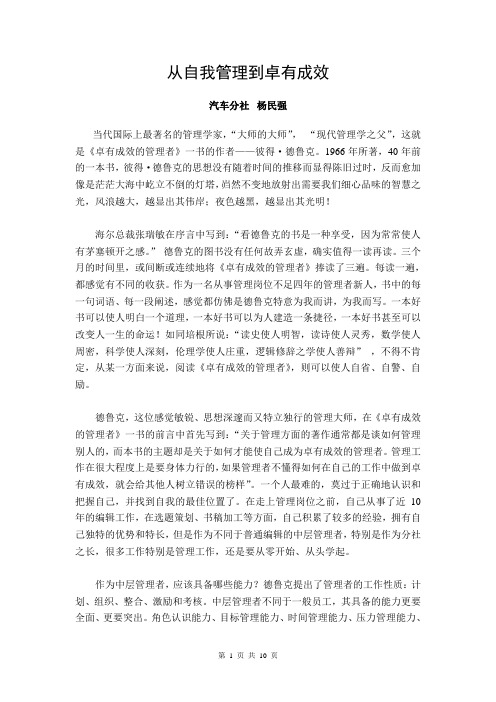
从自我管理到卓有成效汽车分社杨民强当代国际上最著名的管理学家,“大师的大师”,“现代管理学之父”,这就是《卓有成效的管理者》一书的作者——彼得·德鲁克。
1966年所著,40年前的一本书,彼得·德鲁克的思想没有随着时间的推移而显得陈旧过时,反而愈加像是茫茫大海中屹立不倒的灯塔,岿然不变地放射出需要我们细心品味的智慧之光,风浪越大,越显出其伟岸;夜色越黑,越显出其光明!海尔总裁张瑞敏在序言中写到:“看德鲁克的书是一种享受,因为常常使人有茅塞顿开之感。
”德鲁克的图书没有任何故弄玄虚,确实值得一读再读。
三个月的时间里,或间断或连续地将《卓有成效的管理者》捧读了三遍。
每读一遍,都感觉有不同的收获。
作为一名从事管理岗位不足四年的管理者新人,书中的每一句词语、每一段阐述,感觉都仿佛是德鲁克特意为我而讲,为我而写。
一本好书可以使人明白一个道理,一本好书可以为人建造一条捷径,一本好书甚至可以改变人一生的命运!如同培根所说:“读史使人明智,读诗使人灵秀,数学使人周密,科学使人深刻,伦理学使人庄重,逻辑修辞之学使人善辩”,不得不肯定,从某一方面来说,阅读《卓有成效的管理者》,则可以使人自省、自警、自励。
德鲁克,这位感觉敏锐、思想深邃而又特立独行的管理大师,在《卓有成效的管理者》一书的前言中首先写到:“关于管理方面的著作通常都是谈如何管理别人的,而本书的主题却是关于如何才能使自己成为卓有成效的管理者。
管理工作在很大程度上是要身体力行的,如果管理者不懂得如何在自己的工作中做到卓有成效,就会给其他人树立错误的榜样”。
一个人最难的,莫过于正确地认识和把握自己,并找到自我的最佳位置了。
在走上管理岗位之前,自己从事了近10年的编辑工作,在选题策划、书稿加工等方面,自己积累了较多的经验,拥有自己独特的优势和特长,但是作为不同于普通编辑的中层管理者,特别是作为分社之长,很多工作特别是管理工作,还是要从零开始、从头学起。
彼得德鲁克 自我管理 一
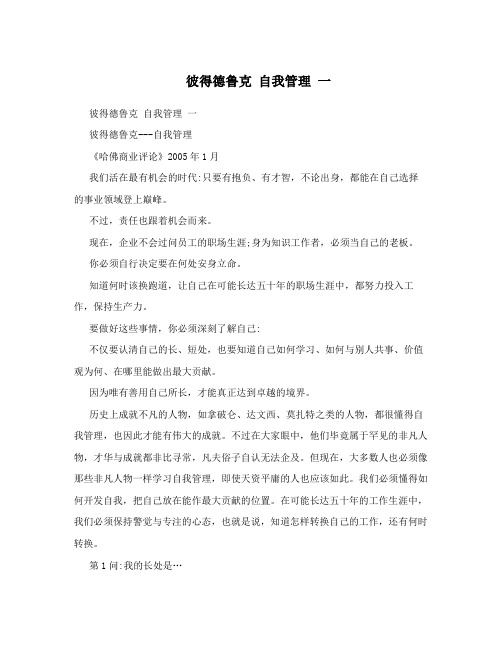
彼得德鲁克自我管理一彼得德鲁克自我管理一彼得德鲁克---自我管理《哈佛商业评论》2005年1月我们活在最有机会的时代:只要有抱负、有才智,不论出身,都能在自己选择的事业领域登上巅峰。
不过,责任也跟着机会而来。
现在,企业不会过问员工的职场生涯;身为知识工作者,必须当自己的老板。
你必须自行决定要在何处安身立命。
知道何时该换跑道,让自己在可能长达五十年的职场生涯中,都努力投入工作,保持生产力。
要做好这些事情,你必须深刻了解自己:不仅要认清自己的长、短处,也要知道自己如何学习、如何与别人共事、价值观为何、在哪里能做出最大贡献。
因为唯有善用自己所长,才能真正达到卓越的境界。
历史上成就不凡的人物,如拿破仑、达文西、莫扎特之类的人物,都很懂得自我管理,也因此才能有伟大的成就。
不过在大家眼中,他们毕竟属于罕见的非凡人物,才华与成就都非比寻常,凡夫俗子自认无法企及。
但现在,大多数人也必须像那些非凡人物一样学习自我管理,即使天资平庸的人也应该如此。
我们必须懂得如何开发自我,把自己放在能作最大贡献的位置。
在可能长达五十年的工作生涯中,我们必须保持警觉与专注的心态,也就是说,知道怎样转换自己的工作,还有何时转换。
第1问:我的长处是…大多数人都自认了解自己的长处,结果往往是误解。
自认了解自己短处的人更多,但也多半是误解。
问题是,唯有发挥长处,才会有优秀的表现,靠短外不可能展现绩效,若是靠自己一窃不通的项目,更不可能成功。
从前,一般人几乎没有必要了解自己有什么长处,因为在出生时,每个人的地位与职业就已经注定。
农民的儿子还是农民,工匠的女儿将来也是会嫁给工匠。
不过现代人可以选择,所以我们必须了解自己的长处,才能找到发挥的空间。
发现自己长处的唯一方法,就是进行回馈分析。
每当你作了重大决策或行动时,记下你预期会发生的情况,等9到12个月后,再把实际结果与你原先的预测相对比。
我用这个方法已经有15到20年了,每次结果都出乎我意料之外。
德鲁克:所有管理的基础在于自我管理
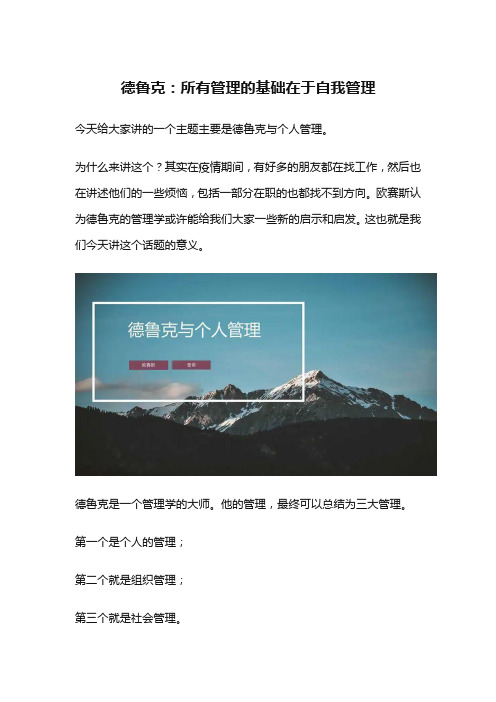
德鲁克:所有管理的基础在于自我管理今天给大家讲的一个主题主要是德鲁克与个人管理。
为什么来讲这个?其实在疫情期间,有好多的朋友都在找工作,然后也在讲述他们的一些烦恼,包括一部分在职的也都找不到方向。
欧赛斯认为德鲁克的管理学或许能给我们大家一些新的启示和启发。
这也就是我们今天讲这个话题的意义。
德鲁克是一个管理学的大师。
他的管理,最终可以总结为三大管理。
第一个是个人的管理;第二个就是组织管理;第三个就是社会管理。
而三大管理当中最根本的点,就在于个人管理。
彼得·德鲁克:自我管理,开启成功之门的钥匙个人管理在我们认为现在,其实它是开启成功的一个钥匙。
为什么这么说?因为一个人他只有管好了自己,他才有资格或者说他才有可能去管理别人。
一个人连自己都管不好,那其他的根本都没有办法来谈。
怎么样去管好自己呢?应该要从以下三个大的方面来去看。
PART01管理概念的时代变迁第一个就是说我们一定要了解对于管理,这个概念要有一个大的时代背景,第一个就是要看德鲁克。
在《21世纪的管理挑战》,德鲁克在1999年写的这本书当中,他有一个非常核心的观点就是每个时代的管理其实都是有不同的内容的。
20世纪30年代的管理范式管理学研究真正始于20世纪30年代,自那时起,大多数学者、作家和管理实践者都认同两套关于管理事实的假设。
第一套假设构成管理原则的基础:1.管理是企业管理。
2.企业应该具有,或必须具有一种恰当的组织形式。
3.企业应该釆取,或必须采取一种管理人的恰当方式。
第二套假设奠定了管理实践的基础:1.技术和最终用户是一成不变和已知的。
2.管理的范围是由法律决定的。
3.管理是对内部的管理。
4.按国家边界划分的经济体是企业和管理依托的“生态环境”。
20世纪80年代旧管理范式式微到了20世纪的80年代的时候,管理概念已经在发生非常大的一个变革,关于管理事实的所有这些假设都已不再有效。
它们几乎成为被讽刺的对象。
它们现在与现实相差得太远,以至于成为阻碍管理理论发展的障碍,更有甚者,它们还严重地妨碍了管理实践。
- 1、下载文档前请自行甄别文档内容的完整性,平台不提供额外的编辑、内容补充、找答案等附加服务。
- 2、"仅部分预览"的文档,不可在线预览部分如存在完整性等问题,可反馈申请退款(可完整预览的文档不适用该条件!)。
- 3、如文档侵犯您的权益,请联系客服反馈,我们会尽快为您处理(人工客服工作时间:9:00-18:30)。
管理自己[Managing Oneself] 参考译文历史上的伟人——拿破仑、达芬奇、莫扎特——都很善于自我管理。
这在很大程度上也是他们成为伟人的原因。
不过,他们属于不可多得的奇才,不但有着不同于常人的天资,而且天生就会管理自己,因而才取得了不同于常人的成就。
而我们当中的大多数人,甚至包括那些还算有点天赋的人,都不得不通过学习来掌握自我管理的技巧。
我们必须学会自我发展,必须知道把自己放在什么样的位置上,才能做出最大的贡献,而且还必须在长达50年的职业生涯中保持着高度的警觉和投入——也就是说,我们得知道自己应该何时换工作,以及该怎么换。
○我的长处是什么多数人都以为他们知道自己擅长什么。
其实不然,更多的情况是,人们只知道自己不擅长什么——即便是在这一点上,人们也往往认识不清。
然而,一个人要有所作为,只能靠发挥自己的长处,而如果从事自己不太擅长的工作是无法取得成就的,更不用说那些自己根本干不了的事情了。
以前的人没有什么必要去了解自己的长处,因为一个人的出身就决定了他一生的地位和职业:农民的儿子也会当农民,工匠的女儿会嫁给另一个工匠等。
但是,现在人们有了选择。
我们需要知己所长,才能知己所属。
要发现自己的长处,唯一途径就是回馈分析法(feedback analysis)。
每当做出重要决定或采取重要行动时,你都可以事先记录下自己对结果的预期。
9到12个月后,再将实际结果与自己的预期比较。
我本人采用这种方法已有15到20年了,而每次使用都有意外的收获。
比如,回馈分析法使我看到,我对专业技术人员,不管是工程师、会计师还是市场研究人员,都容易从直觉上去理解他们。
这令我大感意外。
它还使我看到,我其实与那些涉猎广泛的通才没有什么共鸣。
回馈分析法并不是什么新鲜的东西。
早在14世纪,这种方法由一个原本会永远默默无闻的德国神学家发明,大约150年后被法国神学家约翰·加尔文和西班牙神学家圣依纳爵分别采用。
他们都把这种方法用于其信徒的修行。
事实上,回馈分析法使他们的信徒养成了一种始终注重实际表现和结果的习惯,这也是他们创立的教派——加尔文教会和耶稣会——能够主宰欧洲长达30年的原因。
我们只要持之以恒地运用这个简单的方法,就能在较短的时间内(可能两三年),发现自己的长处——这是你需要知道的最重要的事情。
在采用这种方法之后,你就能知道,自己正在做(或没有做)的哪些事情会让你的长处无法发挥出来。
同时,你也将看到自己在哪些方面能力不是特别强。
最后,你还将了解到自己在哪些方面完全不擅长,做不出成绩来。
根据回馈分析的启示,你需要在几方面采取行动。
首先最重要的是,专注于你的长处,把自己放到那些能发挥长处的地方。
其次,加强你的长处。
回馈分析会迅速地显示,你在哪些方面需要改善自己的技能或学习新技能。
它还将显示你在知识上的差距——这些差距通常都可以弥补。
数学家是天生的,但是人人都能学习三角学。
第三,发现任何由于恃才傲物而造成的偏见和无知,并且加以克服。
有太多的人,尤其是那些术业有专攻的人,往往对其他领域的知识不屑一顾,或者认为聪明的头脑就可取代知识。
比如,很多一流的工程师遇上与人相关的事就束手无策,他们还以此为荣——因为他们觉得,对条理清晰的工程师头脑来说,人太混乱无序了。
与此形成鲜明对照的是,人力资源方面的专业人员常常以他们连基本的会计知识或数量分析都一无所知而自傲。
不过,人们要是对这样的无知还沾沾自喜的话,那无异于自取灭亡。
其实,要让自己的长处得到充分发挥,你就应该努力学习新技能、汲取新知识。
另外一点也同样重要——纠正你的不良习惯。
所谓不良习惯,是指那些会影响你的工作成效和工作表现的事情。
这样的习惯能很快地在回馈中反映出来。
例如,一位企划人员可能发现自己美妙的计划最终落空,原因是他没有把计划贯彻到底。
同那些才华横溢的人一样,他也相信好的创意能够移动大山。
但是,真正移山的是推土机,创意只不过是为推土机指引方向,让它知道该到何处掘土。
这位企划人员必须意识到不是计划做好就大功告成,接下来还得找人执行计划,并向他们解释计划,在付诸行动前须做出及时的调整和修改,最后要决定何时中止计划。
与此同时,回馈还会反映出哪些问题是由缺乏礼貌造成的。
礼貌是一个组织的润滑剂。
两个移动物相互接触时发生摩擦是一个自然规律,不仅无生命的物体是这样,人类也是如此。
礼貌,其实也很简单,无非是说声“请”和“谢谢”,记住别人的名字,或问候对方家人这样的小事,但就是这种不起眼的细节,使得两个人能够融洽相处,不管他们彼此之间是否有好感。
许多聪明人,尤其是聪明的年轻人,没有意识到这一点。
如果回馈分析表明某个人只要一遇到需要别人合作的事就屡屡失败,那么很可能就意味着这个人的举止不大得体——也就是缺乏礼貌。
把预期和实际结果进行比较,也会发现自己不能做什么。
我们每个人都有许多一窍不通、毫无天分的领域,在这些领域我们甚至连平庸的水平都达不到。
人们,尤其是知识工作者,就不应该试图去完成这些领域的工作和任务。
他们应该尽量少把精力浪费在那些不能胜任的领域上,因为从无能到平庸要比从一流到卓越需要人们付出多得多的努力。
然而,大多数人,尤其是教师,还有组织,都一门心思要把能力低下的人变成合格者。
其实,他们还不如把精力、资源和时间花在将称职者培养成佼佼者上。
○我的工作方式是怎样的令人惊讶的是,很少有人知道自己平时是怎样把事情给做成的。
实际上,我们当中的大多数人甚至不知道不同人有着不同的工作方式和表现。
许多人不是以他们习惯的方式工作,这当然就容易造成无所作为。
对于知识工作者来说,“我的工作方式是怎样的?”可能比“我的长处是什么?”这个问题更加重要。
同一个人的长处一样,一个人的工作方式也是独一无二的。
这由人的个性决定。
不管个性是先天决定的,还是后天培养的,它肯定是早在一个人进入职场前就形成了。
正如一个人擅长什么、不擅长什么是既定的一样,一个人的工作方式也基本固定,它可以略微有所调整,但是不可能完全改变——当然也不会轻易改变。
而且就像人们从事自己最拿手的工作容易做出成绩一样,他们要是采取了自己最擅长的工作方式也容易取得成就。
通常,几个常见的个性特征就决定了一个人的工作方式。
我属于读者型,还是听者型?首先,你要搞清楚的是,你是读者型(习惯阅读信息)还是听者型(习惯听取信息)的人。
绝大多数人甚至都不知道还有读者型和听者型之说,而且很少有人既是读者型又是听者型。
知道自己属于哪种类型的人更少。
但是,有一些例子说明了这样的无知可能造成多大的危害。
德怀特·艾森豪威尔担任欧洲盟军最高统帅时,一直是新闻媒体的宠儿。
他的记者招待会以其独特的风格出名——不管记者提出什么问题,艾森豪威尔将军都从容地对答如流。
无论是介绍情况,还是解释政策,他都能够用两三句言简意赅的话就说清楚。
十年后,艾森豪威尔当上了总统,当年曾对他十分崇拜的同一批记者,这时却公开瞧不起他。
他们抱怨说,他从不正面回答问题,而是喋喋不休地胡侃着其他事情。
他们总是嘲笑他回答问题时语无伦次,不合乎语法,糟蹋标准英语。
艾森豪威尔显然不知道自己属于读者型,而不是听者型。
当他担任欧洲盟军最高统帅时,他的助手设法确保媒体提出的每一个问题至少在记者招待会开始前半小时以书面形式提交。
这样,艾森豪威尔就完全掌握了记者提出的问题。
而当他就任总统时,他的两个前任都是听者型——富兰克林·罗斯福和哈里·杜鲁门。
这两位总统知道自己是听者型的,并且都喜欢举行畅所欲言的记者招待会。
艾森豪威尔可能认为他必须去做两位前任所做的事。
可是,他甚至连记者们在问些什么都从来没听清楚过。
而且,艾森豪威尔并不是个极端的例子。
几年后,林登·约翰逊把自己的总统职位给搞砸了,这在很大程度上是因为他不知道自己是听者型的人。
他的前任约翰·肯尼迪是个读者型的人,他搜罗了一些出色的笔杆子当他的助手,要求他们每次进行当面讨论之前务必先给他写通报。
约翰逊留下了这些人,他们则继续写通报。
可是他显然根本看不懂他们写的东西。
不过,约翰逊以前当参议员时曾经表现非凡,因为议员首先必须是听者型。
没有几个听者型的人可以通过努力变成合格的读者型——不管是主动还是被动的努力,反之亦然。
因此,试图从听者型转为读者型的人会遭受林登·约翰逊的命运,而试图从读者型转为听者型的人会遭受德怀特·艾森豪威尔的命运。
他们都不可能发挥才干或取得成就。
○我如何学习要了解一个人的工作方式,需要弄清的第二点是,他是如何学习的。
许多一流的笔杆子都不是好学生——温斯顿·邱吉尔就是一例。
在他们的记忆中,上学往往是十足的折磨。
然而,他们的同学有这种记忆的却很少。
他们可能在学校里得不到什么乐趣,对他们来说上学的最大痛苦是无聊。
有关这个问题的解释是,笔头好的人一般不靠听和读来学习,而靠写来学习,这已成了一种规律。
学校不让他们以这种方式学习,所以他们的成绩总是很糟糕。
所有的学校都遵循这样的办学思路:只有一种正确的学习方式,而且人人都得遵从。
但是,对学习方式跟别人不大一样的学生来说,被迫按学校教的方式来学习就是地狱。
实际上,学习大概有六七种不同的方式。
像邱吉尔这样的人靠写来学习。
还有些人以详尽的笔记来学习。
例如,贝多芬留下了许多随笔小抄,然而他说,实际上他作曲时从来不看这些随笔小抄。
当被问及他为什么还要用笔记下来时,据说他回答道:“如果我不马上写下来的话,我很快就会忘得一干二净。
如果我把它们写到小本子上,我就永远不会忘记了,也用不着再看一眼。
”有些人在实干中学习。
另一些人通过听自己讲话学习。
我认识一位公司总经理,他把一个平庸的小家族企业发展成行业领军企业。
他是一个通过讲话学习的人。
他习惯于每周一次把全体高层管理人员召集到他的办公室,随后对他们讲上两三个小时。
他总是提出政策性问题,在每一个问题上提出三种不同观点。
但他很少请这帮同事发表意见或提出问题,他只需要听众听他讲话。
这就是他的学习方式。
虽然他是一个比较极端的例子,但是通过讲话学习绝不是一种少见的方法。
成功的出庭律师也以同样的方式学习,许多诊断医师也是如此(我自己也是这样)。
在所有最重要的自我认识当中,最容易做到的就是知道自己是怎样学习的。
当我问人们:“你怎么学习?”大多数人都知道答案。
但是,当我问:“你根据这个认识来调整自己的行为吗?”没有几个人回答“是”。
然而,知行合一是取得成就的关键;如果知行不合一,人们就会无所作为。
我属于读者型还是听者型?我如何学习?这是你首先要问自己的问题。
但是,光这些问题显然不够。
要想做好自我管理,你还需要问这样的问题:我能与别人合作得好吗?还是喜欢单枪匹马?如果你确实有与别人进行合作的能力,你还得问问这个问题:我在怎样的关系下与他人共事?有些人最适合当部属。
二战时期美国的大英雄乔治·巴顿将军是一个很好的例子。
